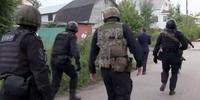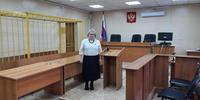Case of Abrosimova and Others in Nizhny Novgorod
Filter
- #
Lieutenant Colonel of Justice Oleg Makerov, senior investigator of the Department of Internal Affairs of the Main Directorate of the Ministry of Internal Affairs of Russia for the Nizhny Novgorod Region, initiates criminal case No. 11901220089000239 for faith against unidentified persons, "in whose act signs of a crime under Part 1 of Article 282.2 of the Criminal Code of the Russian Federation are seen." According to the investigation, they "held meetings, collected donations for the needs of a religious organization, and improved their missionary skills."
- #
In Nizhny Novgorod and the region, searches are being carried out in the homes of believers, equipment is being seized. Peaceful believers Denis Tsarev (born in 1983), Eduard Smirnov (born in 1988) and Galina Abrosimova (born in 1966) become defendants in criminal case No. 11901220089000239.
- #
The case of Galina Abrosimova, Eduard Smirnov and Denis Tsarev is submitted to the Sovetsky District Court of Nizhny Novgorod. It will be considered by judge Ivan Karnavsky.
- #
Hearings on the criminal case against Galina Abrosimova begin. The defense and the prosecution will learn about the hearing 20 minutes before it starts. In this regard, the judge grants the lawyer's request to postpone the hearing.
Judge Karnavsky announces that the trial will be held behind closed doors. He refuses to allow the believer to record the hearing.
- #
The court granted two petitions of the defendant - to make an audio recording of the meeting, as well as to familiarize herself with the list of case materials, since the investigator did not allow her to do this earlier. Judge Karnavsky attaches to the case copies of medical certificates confirming that the believer has serious chronic diseases.
The defendant petitions for the refusal of a lawyer by appointment, since she intends to defend herself.
- #
The court decides to release Abrosimova's defender from further participation in the process. At the same time, the court adjourns the hearing so that the believer can find another lawyer. Otherwise, she will be provided with a public defender. According to the judge, the participation of a lawyer will allow the believer to fully exercise her right to defense.
- #
It becomes known that the case of Tsarev and Smirnov was separated into separate proceedings from the case of Abrosimova. It is assigned a 42101220089000296 number.
- #
Abrosimova was provided with a lawyer by appointment.
The prosecutor reads out the indictment. The believer reads out her attitude to the accusation, in which she expresses her disagreement with it.
- #
Three witnesses do not appear in court, so the testimony of two of them is announced, and the defendant insists on the appearance of the third witness. The prosecutor does not object and proposes to interrogate classified witnesses at the next hearing.
- #
The witness again fails to appear in court. The prosecutor begins to read out the case materials, including a transcript of a hidden audio recording of the worship service.
- #
Judge Ivan Karnavsky rejects Galina Abrosimova's petitions to declassify secret witnesses. The interrogation of "I. A. Verkhoturov" and "I. I. Ivanov" takes place online.
The witness "Verkhoturov", according to him, is a Jehovah's Witness, but does not know what role the defendant played at the services.
Witness "Ivanov" says that he is familiar with the defendant in connection with his work to suppress the activities of extremist organizations. He participated in the conduct of the ORM, including at the address where the defendant lived. Ivanov claims that Abrosimova "organized" worship services at home.
- #
A witness who failed to appear in court several times is being questioned. She explains that she is personally acquainted with the defendant, they worked together in the hospital. The witness says that she cannot say anything bad about Galina Abrosimova, she has never heard extremist appeals from her.
- #
At the next court session, the believer reads out a petition to attach to the case file the response of the Ministry of Foreign Affairs to the letter of Yakku I.V . The judge grants this petition.
The court insists on interrogating the believer, but the prosecutor agrees to give her time to prepare.
- #
A witness on the part of the defense, the son of Galina Abrosimova, speaks. He gives his mother a positive characterization and says that she is "loving, sympathetic, hardworking, always ready to help." He also says that after she began to study the Bible with Jehovah's Witnesses, she changed ("stopped abusing alcohol, her upbringing began to go softer ... all the conflicts that took place were resolved without shouting, without swearing"). The witness also says: "[She] taught to treat the authorities with respect, taught to obey the current laws that are in the legislation. She also taught to always respect the views of others, because every person in our country has the right to his own opinion.
Galina Abrosimova testifies. She tells how much her life changed after she began to study the Bible. For example, she says, "I saw mistakes in my children's upbringing and tried to correct them." Talking about her faith, Galina explains: "When I was baptized, I did not become a member of the Administrative Center, but became one of Jehovah's Witnesses by conviction, just as people become Orthodox or Buddhists." She adds, "My faith did not and does not depend on whether there is a legal seal or not."
The judge interrupts Galina, saying that she should testify, not give a lecture.
The believer notes: "My goal has always been and is good intentions - to help people learn about a loving Creator who wants to give all good people a happy eternal life without wars, hunger, injustice, disease, death. [...] Extremism implies hatred, enmity, violence, which fundamentally contradicts the law of God's love, contradicts my conscience and my faith."
- #
During the debate, the prosecutor asks for a sentence of 7 years in prison for Galina Abrosimova. The announcement of the last word and verdict is expected on April 20.
- #
The last word of the defendant Galina Abrosimova in Nizhny Novgorod - #
Judge Ivan Karnavsky sentences Galina Abrosimova to a 6-year suspended sentence.
- #
The Nizhny Novgorod Regional Court approves the decision of the lower court. The verdict comes into force.


